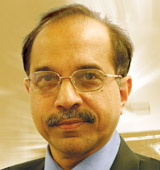|
Executive Interviews: Interview with Ravi Ramamurti on Bottom of the Pyramid
November 2008
-
By Dr. Nagendra V Chowdary
 Dr. Ravi Ramamurti
Dr. Ravi Ramamurti CBA Distinguished Professor of International Business & Strategy, and Director of the Center for Emerging Markets at Northeastern University. 
What should be a CEO's agenda in
the new economic and business
order? What factors do you think
are going influence a CEOs agenda?
We have talked about specific megatrends
that will affect businesses in
the future. But at amore abstract level,
the message is that change is the only
constant, and the rate of change is
accelerating. For these reasons, it will
be harder and harder for firms to
pursue a single strategy that works for
long periods of time, or enjoy
competitive advantages for years and
years.
Instead, firms may have to be content with
|
|
what some people call
'temporary advantage, that is, competitive advantages that last a few
years until the environment changes
or copycats match or exceed those
advantages. In this context, a firmthat
aspires for long term success must be
able to produce a continual stream of
temporary advantages, which is
another way of saying that firms must
be capable of continuous
improvement and constant
innovation. Therefore, one of the CEOs top
prioritiesmust be to ensure that his or
her organization is innovative. This is
not a new message. For at least ten
years now, management experts have
been harping on the need for
innovation. What is relatively new is
the realization that innovation has to
take place in a more dynamic and
competitive context than before. First, innovation must be seen as a
collaborative effort rather than as a
solo effort by the firm in question. As
I discuss inmore detail later, thismay
require the firm to build some new
capabilities for innovation
management. One key external
partner in facilitating innovation is
the customer. Look at how many new
ideas are being co created by firms
and their customers. In many cases,
the customer is directly involved in
customizing a product to suit his or
her needs, as with Google or online
travel booking. Second, innovation must be
approached with a global mindset.
Firms cannot afford to take the
narrow view of competitors or
partners. It is not only the traditional
rivals in ones industry or firms
down the street that will be your
competitors, but any firm in any part
of the world. Remember the bornglobal
firms in far corners of the globe
who may be pursuing the same
opportunity that you have identified.
Similarly, your potential partners in
pursuing a new opportunity could be
in any part of the world. Anything
less than a globally optimized supply
chain may not suffice to survive
competition in the commercialization
phase. This will be as true for Indian
firms as it is for American or
European firms. In this context, What do you think would be the
critical success factors for global
firms in the new business order and
what should be key result areas for
the executives in the new economic
and business order?
The critical success factors will be
flexibility, continuous innovation,
and the capacity to take a global
perspective. One of the often cited capabilities
that companies should develop is
managing multicultural teams. How
do individuals develop their
capability to adapt effectively across
different cultures? Why do some
individuals possess superior
capacity to deal with the challenges
of working in different cultures?
How do individuals reach full
productive potential working in
culturally diverse work
environments in their home
countries and overseas? How do
organizations build capability for
effective work assignments in
locations around the world? How do
organizations optimize individual
and collective performance when
they harness the cultural diversity of
their people across the world?
At the individual level, a person's
ability to work effectively across
cultures is partly inborn and partly
shaped by life experiences. There
isn't much one can do about inborn
traits, but there is much that one can
do to create life experiences that
promote cultural sensitivity. The
latter includes such things as
socializing with people from different
rather than similar backgrounds,
learning a foreign language, traveling
abroad, or doing stints in a foreign
country. With globalization, the
world has come to India, and
therefore, even a person who doesnt
leave the country can get a lot of crosscultural
exposure think of the
employees working in call centers or
as part of multi country research or
project teams. One advantage of working in call centers that should
not be overlooked is that it gives
thousands of young Indians
exposure to people from another
country. This will serve them well
when they move on to other jobs. At the company level, training
programs, job rotation, international
travel, and diligent career planning
can create a cadre of people who are
good at managing across cultures. Of
course, this will cost money, because
international travel and assignments
are expensive, but it will also provide
the company in question a
competitive advantage. The current business lexicon
consists of competitive advantage/
edge, strategic positioning, core
competencies, value chain, value
nets, value creation and value
migration, shareholder activism,
corporate governance, corporate
social responsibility, blue ocean
strategy, etc. What do you think
would be, rather should be, the new
business lexicon?
Management buzz words and fads
come and go. It is not helpful to add
more jargon to what already exists.
Much of the time, new buzz words are
merely old ideas recycled as new
mantras. It will always be important
to listen to customers, to innovate
continually, to know how to partner
with suppliers, customers, and
sometimes competitors; and to have a
global vision of opportunities and
challenges.
1.
Bottom of the Pyramid Case Study
2. ICMR
Case Collection
3.
Case Study Volumes
|
